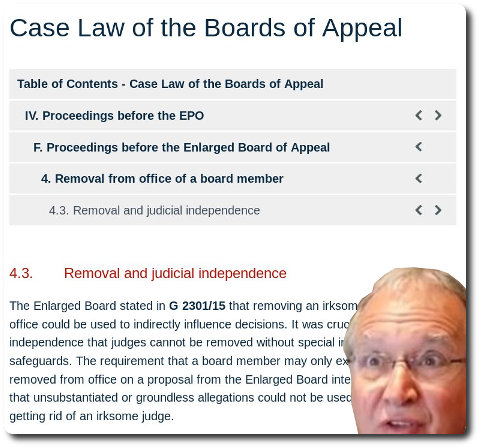

LAWLESSNESS at the EPO has become so routine that it's almost banal now. It's the new norm.
In a letter addressed to the heads of delegations of the administrative council, the EPO’s Central Staff Committee said that the office had informed Corcoran he would be “permanently transferred in February 2018 to a post of senior expert in classification expressly created for him in The Hague”.
The committee argued that “transferring [Corcoran] to a country in which he had never lived is a further burden for him and his family”.
The committee also argued that the office “did not fulfil its duty of care by assessing medically whether the employee was fit for a transfer. For medical or personal reasons, the employee may have to refuse to be transferred and in such case the President may decide to terminate his service”.
The interference between the Broad Institute and the University of California/Berkeley has been in the spotlight over the past year (see "PTAB Decides CRISPR Interference -- No interference-in-fact"; "PTAB Decides CRISPR Interference in Favor of Broad Institute -- Their Reasoning"; "University of California/Berkeley Appeals Adverse CRISPR Decision by PTAB"; and "Berkeley Files Opening Brief in CRISPR Appeal"). But there have been other skirmishes between the parties, each of which has recently been (for now) resolved.
[...]
In Europe, under Article 87 EPC and Paragraph IV of the Paris Convention, priority to an earlier-filed application can be validly claimed by the prior applicant or by her successor in interest. In either case, the applicant must be someone having the right to claim priority. In the U.S., provisional applications are filed in the name of the inventor and the EPO requires that there be an assignment of the invention on or before a European or PCT application is filed. (Of course, a PCT can always be filed naming the inventors as applicants.) In this case, proper application of the applicable rules required both the named applicants (The Broad Institute, MIT and Harvard College) and the Rockefeller to have been named as applicants when the application was filed. Rockefeller was not named as an applicant. Accordingly, the OD determined that the named Proprietors could only validly claim priority to the third provisional application, and by the filing date of that application there had published prior art that invalidated the granted claims. In this regard, the preliminary opinion may provide guidance on the OD's thinking, where that opinion states that "In both the EPC and the Paris convention systems the decisive fact for a valid claim of priority is the status of applicant, rather than the substantial requirement [] to the subject matter of the first application" (emphasis in opinion). The OD determined (preliminarily) that "neither the requirement of the applicant's identity nor the proof of a valid success in title [had] been fulfilled" for the claimed invention, and stresses that these were requirements to promote legal certainty that would protect third parties' interests, and that these requirements were not subject to the national law of the priority document. Nor, according to the preliminary opinion could the granted European patent properly claim priority to U.S. 61/758,468 because that document failed to disclose the length of the guide sequence as claimed.
Comments
katkatkat
2018-01-27 07:38:48